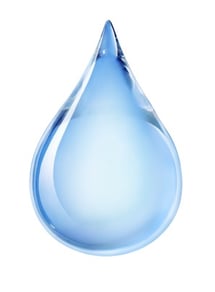Water cleans, purifies, enlivens, refreshes, and quenches thirst. It splashes, rains, runs and makes everything grow…water is this unique substance that seems to contain the essence of life itself. Water, like food, is a study into itself.
Water is critical for health because of the many benefits: 
•Increases immune function (significant increase in white blood cells)
•Boosts energy metabolism
•Enhances weight loss
•Superior hydration of body and blood
•Cardiovascular health benefits and blood pressure regulation
•Cellular detoxification
•Improves skin elasticity
•Detoxifies the bowel and relieves constipation
Water is as much a nutrient as food
The human body is composed of 25% solid matter and 75% water. Brain tissue is 85% water. You can survive for weeks without food; however, you can’t survive for more than a few days without water. Water is the most important detoxification agent and is the solvent that makes all bodily functions possible. The quantity and quality of the water you drink has a direct effect on your health. Dehydration, common in our 20th century, fast-paced life, can be a major contributor to your health problems. Therefore, water is not only basic preventive medicine, but also an important ingredient for healing. Water is not only by far the cheapest form of medicine; it is also one of the most important.
How much water should you drink?
The easy answer is drink whenever you are thirsty; however if you have chronic dehydration your thirst mechanism does not work well and you may not feel thirst. For many chronic and common health problems, as well as prevention, drinking a minimum of six to eight 8 oz. glasses of water per day is recommended, and more is needed if you are exercising or in hot weather. Alcohol, tea, coffee, and other caffeine-containing beverages and sugar drinks do not count because the chemicals in these liquids may cause dehydration. The best time to drink water is away from food. If you drink over half a glass of water at meals you may dilute your digestive juices! Your thirst should be satisfied at all times. It takes time for hydration therapy (drinking water) to take effect. Like a sponge, the tissue membranes will take on water slowly.
How to hydrate properly
We suggest hydration therapy for many of our patients as an initial step to balancing their body chemistries. To adequately hydrate the body, it is best if you drink the water a little at a time over one or two days. Tissues and membranes can only take on water slowly.
Depending upon your weight, drink four ounces of water each hour. The amount of hours is determined by your weight divided by eight, which equals the number of hours you need to drink the water. For example, if you weigh 100 pounds, 100 divided by 8 equals 12.5. So, roughly twelve and one half hours of drinking four ounces of water every hour is needed to hydrate the body properly. This can be done in one day. If your weight is 200 pounds, 200 divided by 8 equals 25. That is 25 hours of drinking four ounces of water hourly. This would be accomplished over two days. To enhance the water even more, you can add electrolytes and minerals, especially when the weather is hot.
The best water containers
To constantly satisfy your water needs it is advisable to carry your water with you. The type of container you use is very important. Stainless steel is best, or glass or ceramic. A plastic BPA free bottle is made of recyclable #4 plastic and contains no BPA. Avoid plastic containers with a #3, #6 or #7 stamped on the bottom, as these may pose a health risk.
Quality of water
Of course, the quality of the water you drink, like food, can have an impact on your health. There are a number of options for the quality enhancement of water. These devices filter out impurities which are often present in water. The ideal drinking water system would be pure water that is enhanced with oxygen and minerals and thus is alkaline, and stored in glass containers. There are many reverse osmosis water filtration systems or multi-stage systems, some for the whole house and great under-the-counter units, and prices are more reasonable now due to increased competition. The water pitcher systems will reduce some contaminants and are easy to use.
Do you like to take long showers?
Since we are the subject of water, did you know that while in a 30-minute bath or shower, it has been shown that you can absorb as many toxic chemicals as you would if you were drinking the water all day? Chlorine and other chemicals are used in tap water to minimize the bacterial contamination. You can install a competent water filter with your showerhead (or a whole house purification system) to remove chlorine so that your skin is exposed to filtered water.
Water is not only by far the cheapest form of medicine; it is also one of the most important. Hydrate well.
.png?width=305&height=132&name=NIHAlogoBLUE_3_transparent%20(2).png)
